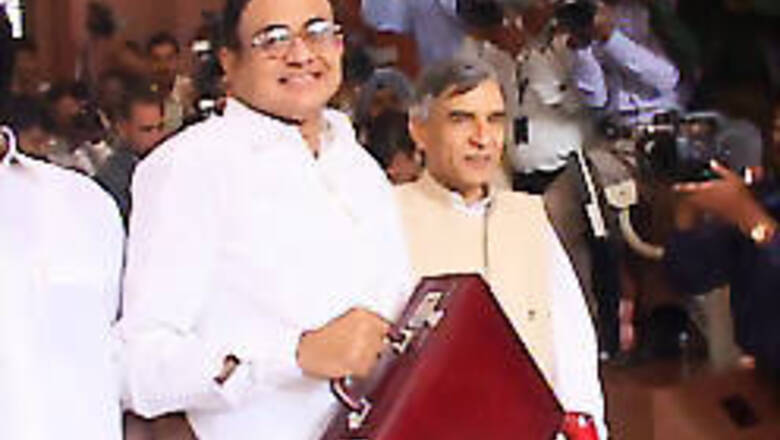
views
Finance Minister P Chidambaram will present the Union Budget on February 29. The presentation of the Budget is one of the most closely followed events in India as it affects almost every one in the country.
How Chidambaram is going to address the social sector this Budget? Will the Finance Minister play it safe this Budget keeping general elections in mind?
To find out all the answers, IBNLive.com organised an online chat with Vice-Chancellor of Jawaharlal Nehru University B B Bhattacharya.
Here we reproduce the full text of his chat.
Arul: The levy of service tax on the interest charges of credit card is like adding salt to the injury. The FM is requested to waive the same in this budget.
B B Bhattacharya: The problem for the Finance Minister is nearly 60 per cent of GDP now comes from service tax. Therefore he has no option but to widen the tax base to services.
Nilesh Rana: Giving greater subsidies to the farming sector is the only solution from preventing India from becoming a full time food importer.
B B Bhattacharya: Experience shows that subsidies do not increase agricultural output. Data also reveal that most subsidies benefit only rich farmers. However, given the election mood I do not expect the FM to be tough on this.
Nilesh Rana: The common man must be relieved from soaring prices of essential commodities which has almost negated the growth achieved so far in terms of economic growth.
B B Bhattacharya: The prices of essential commodities would depend critically on the agricultural growth and supply of food etc on the one hand and money supply growth on the other. Neither of them is directly related to Budget.
Amritanshu: Hi Mr Bhattacharya! how this budget will make an impact on people who are expecting to buy home this financial year?
B B Bhattacharya: Already the RBI is concerned about excessive home loans given by commercial bank. Given the sub-prime crisis witnessed in USA, I do not expect RBI to relax control on home loans.
G K KASHYAP: What measures would the FM adopt to meet the FRBM targets? The social programmes announced in the past few budgets have been a drastic failure; in order to put a aam aadmi posture will the FM continue with such programmes and allot huge amounts to them? Can an individual expect some tax respite in the coming budget?
B B Bhattacharya: Thanks to the tax revenue collection. The government is almost on target in fulfilling FRBM target. By next Budget I expect the gross fiscal deficit to be around 3 per cent of GDP, which was the target under FRBM act. However, the zero revenue deficit target is unlikely to be fulfilled especially if government gives tax concession and also enhance expenditure under rural development act.
Kapil Kulshrestha: Sir, what you think about the way in which government is investing in rural areas and the initiatives being taken by government for welfare of rural mass and the people associated with it. What are the core issues government should take care of in coming budget?
B B Bhattacharya: This being the last general Budget before the election, i am expecting the government to hike rural development expenditure and also some schemes for the rural and informal sector such as subsidies crop insurance and medical insurance. The government is also likely to widen the coverage of national rural employment guarantee scheme from currently 300 districts to all of 600 districts in the country.
PAGE_BREAK
Rachna:Budget news highlights always focus of projected GDP growth rate ...I am wondering will the Govt ever start realizing the importance of human development.
B B Bhattacharya: In preparation of the Budget government must use a anticipated GDP growth rate to forecast expected tax revenues. Presently expectation is that overall GDP growth rate in 2008-09 would be around 8 per cent and for non-agricultural sector around 10 per cent. With about 5 per cent inflation the budget may calculate revenue at a minimum growth of 15 per cent.
S. R. BHAGWAN: Hello Dr. Bhattacharya, I being a govt servant think what effects could the budget hold for me? In particular with the Sixth Pay Commission in sight, what do u think will the budget estimates and the allocation for the expenditure towards the payment of arrears and the hike in pay scales for the govt employees?
B B Bhattacharya: I think the Finance Minister would factor in some amount for anticipated pay hike after 6th pay commission report.
Sampath: Will there be any changes in the tax slab?
B B Bhattacharya: At the moment tax rates in India are quite low compare to most developed country. However this being the last general budget before the next election the Finance Minister may hike the tax exemption limit to about 1.5 lakhs and also reduce taxes on some mass consumption goods. I do not anticipate any change in corporate tax rate or on custom duties on agricultural products.
Niladri Ganguly: Hello Sir, I have an academic query to pose, more to do with monetary policy: When RBI increases the interest rate, prices are expec to drop in the future, as a result, currency value will increase, resulting in foreign investors to invest in INR--> Foreign investment flow to India. BUT When RBI increases the interest rate, borrowing decreases/ production decreases, resulting in decrease in employment rate, therefore, recessionary--> Economic growth not sustainable --> Foreign investors NOT to invest in India. So, my question is what do we make out of the implications of an interest rate change on the foreign investments.
B B Bhattacharya: On the question of interest rate the RBI has a dilemma. If it lowers interest rate then it may increase also unwanted credit and housing and personal finance and thereby also increase money supply and inflate the economy. On the other hand it needs to align the interest rate to the global level to encourage more and more investment. On balance it appears that RBI is doing a wait and watch policy.
Siddhartha: On which basis Finance ministry permits tax evasion?
B B Bhattacharya: Finance minister does not permit any tax evasion but it happens due to plethora of loopholes in tax laws and tax system. To give an example one can open multiple bank accounts without informing the tax authorities. This is the way even kidney racket operator were able to earned illegal money and not pay even a pie of tax. What we need therefore is a complete computerization and digital linking of all bank transactions in the country.
Amit: How should finance minister address the problem of exporters who are facing stiff competition after rupee appreciation of 10% in last 12 months.
B B Bhattacharya: The main reason why the rupee is appreciating is due to unwarranted inflows of portfolio capital. Currently about 6 billion dollars is coming from across into our stock market. The RBI can't buy all of them because it will further escalate the money supply growth. The better option would be to slow down the portfolio investment through restriction of participatory note FII and secondly to tax capital gains arising from short-term portfolio investment in the stock market. This would balance the rupee appreciation as well as the export.
Amit: How should finance minister address the problem of petrol and diesel price hike?
B B Bhattacharya: there are 2 ways FM can address the issue. first he can cut down both custom and excise duties and secondly hike the prices directly. I would recommend a combination of two so that the inflationary impact is minimized.



















Comments
0 comment